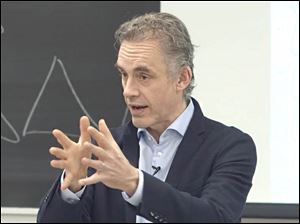
EDITORIAL
Language police vs. free speech
12/15/2017

Jordan Peterson, a professor of psychology at the University of Toronto.
Last month, a teaching assistant at Wilfrid Laurier University, in Ontario, Canada, named Lindsay Shepherd was sanctioned by her supervising professor, along with a “manager of Gendered Violence Prevention and Support” and one other professor.
Her crime? Showing her classes a YouTube video of a nationally televised news program, The Agenda with Steve Paikin, in which Jordan Peterson and four other academics debate a recent law concerning the use of gender pronouns. No one in the video criticized transgender people; the question under discussion was whether or not the law should require Canadians to use the pronouns that other people choose for themselves, with Mr. Peterson arguing no.
Click here to view more Blade editorials
For this, the two professors and the administrator charged Ms. Shepherd with gender-based violence and transphobia under the Ontario Human Rights Code.
So who is Mr. Peterson, whose mere presence in a YouTube video in a Canadian college classroom can get a teaching assistant accused of gender-based violence and transphobia?
He is a professor of psychology at the University of Toronto, who rose to international prominence for publicly opposing the law that Ms. Shepherd was alleged to have broken by showing a clip of him. That law is Canada’s Federal Bill C-16, which adds legal protection for “gender identity” and “gender expression” to the Canadian Human Rights Act and the criminal code. In his Senate hearing, Mr. Peterson argues the bill would codify a specious ideology of gender into law and furthermore lay the legal groundwork for compelled speech in Canada — an unprecedented threat, as he sees it, to the country’s tradition of freedom of expression.
Free Speech is a protection Mr. Peterson holds sacred, having spent the large part of his academic career studying how far-right and far-left political ideologies rose to power in the 20th century. In speaking up against what he regards as dangerous legal precedents, Mr. Peterson wishes to warn Canada off a path he believes could lead Western societies to repeat the totalitarian nightmares of the 20th century.
He is, thus, a more committed anti-fascist than almost any of his contemporaries. But according to one of the professors heard in a secret recording by Ms. Shepherd, even neutrally presenting a clip of Mr. Peterson to the class is “like neutrally playing a speech by Hitler.”
Had Ms. Shepherd not recorded her interactions with the professors who sanctioned her, the university is unlikely to have taken any special notice of her case. But when her tape became a viral story and brought the mass opprobrium of the Internet down on Wilfrid Laurier, the university’s president, Deborah MacLatchey, issued a formal apology, along with the faculty who had reprimanded her.
Legal scholars have since argued that Ms. Shepherd did not violate Bill C-16 under the Ontario Human Rights’ Code, and indeed she did not. Mr. Peterson’s argument against the law has always been far-sighted: while it may be innocuous now, its over-broad language opens the door to future legislation seeking to compel speech. One year later, the law is being used to justify the Stalinist speech rules of a Canadian public university.